|
|
|
Sort Order |
|
|
|
Items / Page
|
|
|
|
|
|
|
| Srl | Item |
| 1 |
ID:
094444


|
|
|
|
|
| Publication |
2010.
|
| Summary/Abstract |
Since normalising diplomatic relations in 1972, successive Australian and Chinese governments have focused on deepening trade and investment links to such an extent that China now looms as one of the most critical countries on Australia's twenty-first century horizon. For their part, Chinese elites have welcomed closer ties with Australia and have been particularly keen to accelerate China's direct investment in the Australian mining and energy sectors. Since the early 2000s, a number of commentators have argued that Australia has been gradually drifting towards China's sphere of influence in the Asia-Pacific. This trend, they argue, has been reinforced following the election in 2007 of the Labor party government, which has terminated Australia's involvement in quadrilateral talks with the US, India, and Japan; stepped back from commitments to export uranium to China's long-standing rival, India; and intensified Australia's public criticism of Japanese whaling practices. Meanwhile, in 2008, Prime Minister Kevin Rudd made a point of paying a high profile visit to China during his first major overseas journey, but not matching it with a visit to Japan. Is Australia drifting towards China's strategic orbit in Asia? The article examines this question through the prism of three key indicators of realignment and concludes that, while there is some evidence of Australia accommodating Chinese strategic preferences in Asia, there is no indication that it is realigning itself strategically towards China and away from its long-standing ally, the US.
|
|
|
|
|
|
|
|
|
|
|
|
|
|
|
|
| 2 |
ID:
106564
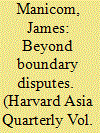

|
|
|
| 3 |
ID:
132883
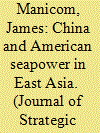

|
|
|
|
|
| Publication |
2014.
|
| Summary/Abstract |
Debates about the future of American seapower in East Asia turn on the argument that American seapower presents a risky and costly luxury that undercuts the cooperative potential of US-China relations. This article asks whether accommodation between China and the United States on the possession and exercise of American seapower in East Asia is possible. Accommodation on this front could significantly lower the risks of unintended escalation and in turn undermine arguments that favour an American retreat from East Asia. The article outlines how accommodation can be achieved on the exercise of American seapower in the region.
|
|
|
|
|
|
|
|
|
|
|
|
|
|
|
|
| 4 |
ID:
113181


|
|
|
|
|
| Publication |
2012.
|
| Summary/Abstract |
Assessments of how international actors are responding to China's rise typically focus on rival great powers or on China's Asian neighbors. In these cases, relative power, geographic proximity, and regional institutions have conditioned relationships with China. The relationship of China with the developing world has mainly been defined by power asymmetry and the appeal of the Chinese governance model to authoritarian regimes. Largely absent from this discussion is an understanding of how Western middle power democracies are responding to China's rise. This article compares how Canada and Australia - two Western democratic states with prominent middle power foreign policy traditions - are responding to the rise of China. The two case studies are similar in many respects: both are resource-based economies with a track record of bilateral and institutional engagement in the Asia-Pacific, and both are key US allies. These similarities allow differences in the Canadian and Australian responses to China's rise to be isolated in the political, economic, and strategic realms.
|
|
|
|
|
|
|
|
|
|
|
|
|
|
|
|
| 5 |
ID:
121434
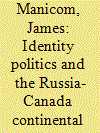

|
|
|
|
|
| Publication |
2013.
|
| Summary/Abstract |
The geopolitics of the Arctic region is viewed as a race for resources between coastal states. Yet, alarmist assessments are tempered by the reality that the most economically viable hydrocarbon reserves are entirely contained within the uncontested EEZs of the littoral states. Given this situation, confrontational rhetoric coming from Ottawa and Moscow seems not only troubling but peculiar. This article attempts to explain this peculiarity. It argues that leaders in both states seem willing to emphasise the ideational salience of disputed space to domestic audiences while downplaying their cooperative track record. The article finds mixed evidence of the instrumental use of national identity politics in Arctic issues, which often conflate distinct elements of Arctic geopolitics. While this dynamic has not yet prevented cooperation over disputed boundaries, perpetuation of these narratives may erode domestic support for dispute settlement.
|
|
|
|
|
|
|
|
|
|
|
|
|
|
|
|
| 6 |
ID:
085721
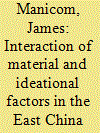

|
|
|
|
|
| Publication |
2008.
|
| Summary/Abstract |
This article seeks to explain the current phase of the East China Sea dispute between China and Japan. It argues that previous analyses privilege one aspect of the dispute over the other. Some stress the nationalist dimension of the dispute while others argue the primary motivations relate to the material wealth of the seabed combined with increased energy needs in China and Japan. By analysing the interaction between the nationalist (ideational) and resource (material) dimensions, it becomes clear why it has become increasingly difficult for policy elites in either state to seek compromise. This is because nationalist constituencies in China and Japan have extended their nationalist/ideational sentiment from the Senkaku/Diaoyu Islands to the entire East China Sea. Simultaneously, Beijing and Tokyo's interest in the material exploitation and security of the East China Sea has risen.
|
|
|
|
|
|
|
|
|
|
|
|
|
|
|
|
| 7 |
ID:
098458
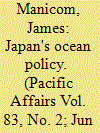

|
|
|
|
|
| Publication |
2010.
|
| Summary/Abstract |
In 2005-2006 Japan began asserting the jurisdictional rights to its maritime domain with greater authority than ever before. Tokyo prepared to conduct exploratory drilling in the disputed East China Sea and passed new laws to permit the full realization of Japan's maritime rights and responsibilities. This activist turn appears to be at odds with most explanations of Japanese strategic policy. Given its preference for strategic evolution, Japan's sudden preoccupation with the security and administration of its extended maritime zones-the Exclusive Economic Zone (EEZ) and its extended continental shelf-following years of neglect is striking. Moreover, this shift has not received a great deal of attention in the literature. This paper argues that Japan's hesitant, ad hoc and incomplete response to its changing maritime environment can be understood through Kent Calder's "reactive state" paradigm. While academic discussion of Japanese foreign policy has moved beyond the reactive state debate, Japan's approach to its ocean policy appears to fulfill both of Kent Calder's reactive state criteria. This paper analyses Japan's resistance to the expansion of state sovereignty seaward and explores how this policy inertia was exposed by China's more active maritime policy. This more assertive Chinese posture triggered the proactive turn in Japan's ocean policy, which may have negative consequences for regional security.
|
|
|
|
|
|
|
|
|
|
|
|
|
|
|
|
| 8 |
ID:
106358
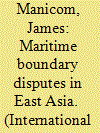

|
|
|
|
|
| Publication |
2011.
|
| Summary/Abstract |
The impact of climate change on the circumpolar north has raised the profile of the Arctic Ocean to coastal states and presents serious foreign policy challenges. Chief among these is the pending delimitation dispute over the extended continental shelf between Canada, Denmark, the United States, and Russia. While delimitation disputes are not new to Arctic states, extended continental shelf claims are complicated by the existence of multiple claimants and a still developing international legal regime. To inform policymakers about what to expect from overlapping claims to disputed maritime areas, this paper draws comparative lessons for Arctic policymakers based on East Asia's experience responding to overlapping jurisdictional entitlements created by the UN Convention on the Law of the Sea (UNCLOS). East Asian states have been grappling with the challenge presented by overlapping claims to resource-rich seabeds since the region ratified UNCLOS in the mid-late 1990s. In light of similar geographic conditions (a dispute over a semi-enclosed sea), alliance structures and the relative infancy of the claimant states with UNCLOS entitlements-Canada only ratified the treaty in 2003, and the United States has yet to do so-this paper sets out the case that important comparative lessons can be drawn from the East Asian experience with maritime delimitation disputes.
|
|
|
|
|
|
|
|
|
|
|
|
|
|
|
|
| 9 |
ID:
132882
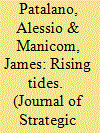

|
|
|
|
|
| Publication |
2014.
|
| Summary/Abstract |
In this issue of The Journal of Strategic Studies, we join the debate over the role that seapower plays in the current re-shaping of security relations in Northeast Asia and we aim to make three contributions to it. First, we argue that seapower matters because East Asia is a maritime region, one in which maritime forces are a primary tool underscoring both cooperative and competitive regional dynamics. Second, we suggest that claims of an emerging naval arms race in East Asia are not supported by the way the different regional countries are debating the pursuit of enhanced capabilities. In the region, there are certainly signs of capabilities procured with neighbouring actors in mind, but these procurement plans are only a fraction of much more complex and articulated policies that have to do with the wider evolving strategic meaning that the sea has for each of the nation states under examination. The third contribution of this issue concerns the realm of methodology. Over the past decade and a half, a number of new source materials emerged in China, Japan, and the Republic of Korea (ROK) that enabled scholars with language expertise to engage in greater depth in the study of defence policy and military modernisation in East Asia. The articles in this issue aim to showcase how different methodologies, ranging from contemporary history to political science, can be applied to articulate nuanced analysis.
|
|
|
|
|
|
|
|
|
|
|
|
|
|
|
|
| 10 |
ID:
084360
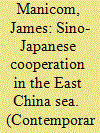

|
|
|
| 11 |
ID:
088730
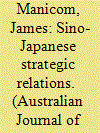

|
|
|
|
|
| Publication |
2009.
|
| Summary/Abstract |
This article analyses the strategic dynamics of the Sino-Japanese relationship and argues that the potential for confrontation between China and Japan has been exaggerated. There is an underlying tendency in much of the literature to treat the emergence of rivalry between China and Japan since the end of the cold war as synonymous with an inevitable drift towards bilateral strategic confrontation. This article argues that Beijing and Tokyo are better placed to manage the strategic dimension of their bilateral relationship than many analysts have been willing to acknowledge thus far. To test this argument, the article examines two prominent case studies that lie at the heart of the contemporary and future Sino-Japanese bilateral strategic relationship: the territorial dispute over the East China Sea and Japan's virtual nuclear weapons capability
|
|
|
|
|
|
|
|
|
|
|
|
|
|
|
|
|
|
|
|
|